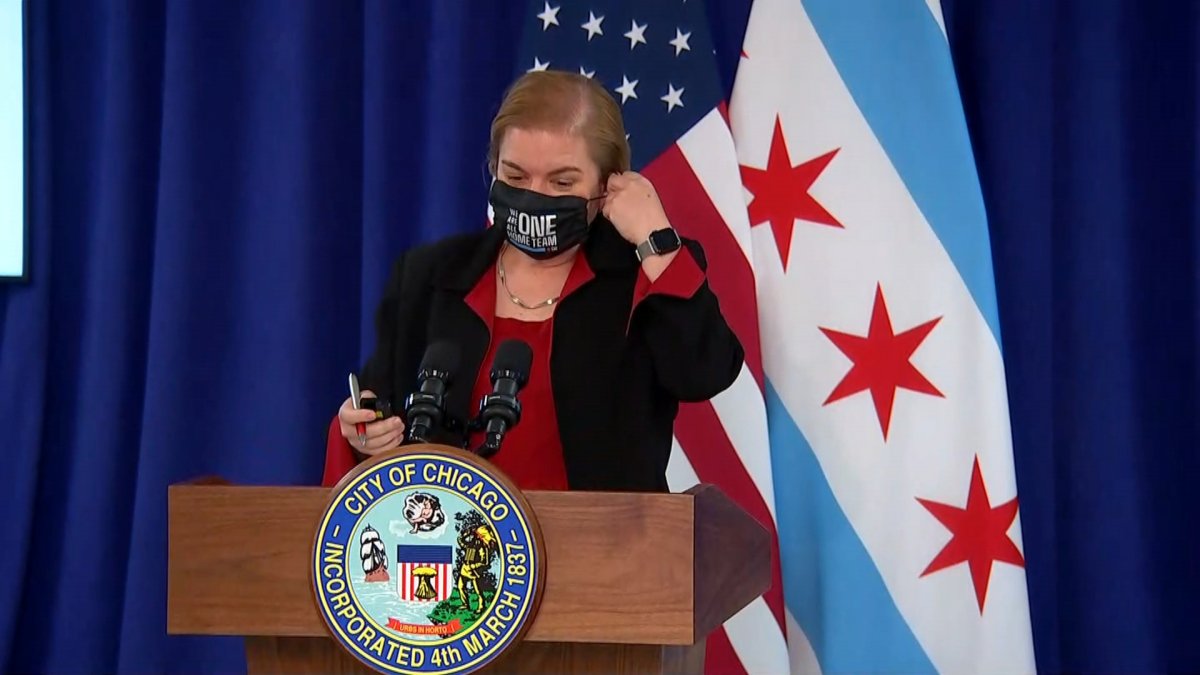
Chicago Department of Public Health Commissioner Dr. Allison Arwady breaks down the city’s latest coronavirus data and updates the city’s travel order.
Chicago's top health official is urging people not to forget their flu shots during the coronavirus pandemic, but getting the shot might not look the same.
Chicago Department of Public Health Commissioner Dr. Allison Arwady said Tuesday the city has been preparing for flu season.
"We are using our flu vaccine campaigns to practice, prepare and test some of what we're thinking about for COVID vaccines," she said. "For example, historically, the Chicago Department of Public Health would say come one, come all for flu clinics, open up in aldermen's offices, open up in our van, etc. We are moving to, instead, more controlled settings."
Other examples include having people register in advance and moving to paperless as much as possible.
"It is really important. Flu shots are just becoming available and we need people to get a flu shot," Arwady said. "The last thing we want to see this fall and winter is any amount of COVID, even the amount we have now, on top of our predictable pandemic, which is our flu season every year. Our hospitals get full every winter largely because of flu."
But there could be some good news in store. Arwady said data from the Southern Hemisphere shows we could see a more milder flu season thanks to precautions people are taking with coronavirus.
Still, Arwady stressed that flu and coronavirus are very different and should both be taken seriously.
Local
"The vaccine is so important, especially for younger people and older people," Arwady said. "Different from COVID, flu hits young people very hard."
Already, Chicago and Illinois are seeing rises in coronavirus cases heading into the fall. With restrictions still in place statewide, Arwady said the city won't consider loosening its restrictions until the outbreak is further under control.
As of Tuesday, the city was seeing a rolling average of 307 new cases per day, Arwady said. That number is lower than the roughly 1,000 new cases the city was seeing each day on average at the peak of the pandemic in early May, she said - but still not as low as officials want it to be.
Arwady said last month that that number "is the best reflection of the burden of our disease" and that the current daily average puts Chicago in a "high incidence state."
Health officials want that number to drop below 200 to get out of the "high incidence state" and before they will consider loosening any restrictions put in place to curb the spread of the virus, Arwady said.
The city dropped below 200 in June, Arwady said, but surpassed that figure again in July, prompting Chicago officials to shut down indoor service at bars and other establishments that serve alcohol without a food license and to cut the size of parties allowed at restaurants from 10 to six people, among other changes.
Meanwhile across the state, health officials in Illinois confirmed 1,740 new cases of coronavirus on Tuesday, along with 27 additional deaths related to the virus.
According to new data from the Illinois Department of Health, the state’s total number of coronavirus cases during the pandemic has now risen to 209,594.
Tuesday's 27 additional deaths bring the state’s death toll from the virus to 7,782 total fatalities.
According to officials, a total of 34,175 new tests were performed over the last 24 hours, bringing the statewide total to 3,439,272.
Tuesday's new test results bring the state’s 7-day rolling positivity rate up by one-tenth of a percent, from 4.2% to 4.3%, according to newly available data.
Still, hospitalization numbers were down slightly on Tuesday, with 1,510 coronavirus patients currently hospitalized in the state. Of those patients, 335 are currently housed in intensive care units, while 128 patients are currently on ventilators.
Illinois' health department has been reminding residents to continue getting their typical vaccines despite the pandemic.
“Vaccines are one of the safest and most effective methods to protect children from more than a dozen vaccine-preventable diseases," IDPH Director Dr. Ngozi Ezike said earlier this month. "Make sure your children are fully vaccinated so they can be as healthy as possible while facing the ongoing risk of COVID-19.”
Though children typically receive their vaccinations prior to school starting, IDPH advised people of all ages to ensure they are up to date on immunizations.
Officials said adults should get a flu vaccine every year and a Td booster vaccine or Tdap immunization every 10 years. The Tdap vaccine is also recommended for pregnant women during each pregnancy, according to health officials.
IDPH reminded adults ages 50 and older to receive the shingles vaccine, and adults ages 65 and older to receive both pneumococcal vaccines one year apart.